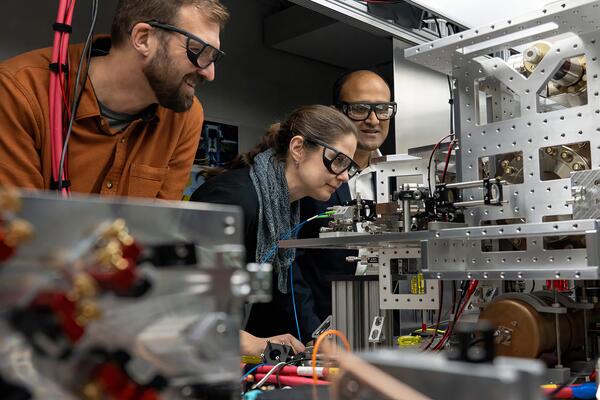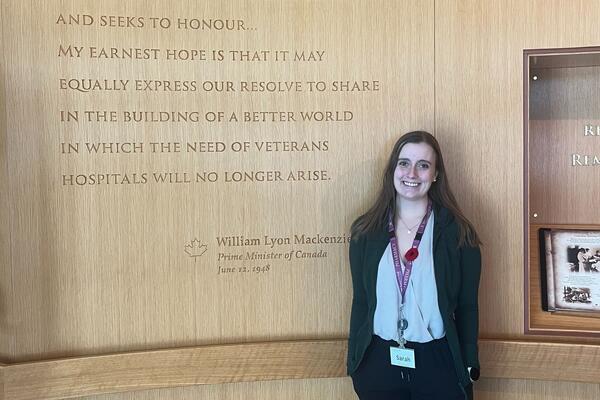
Amplifying diverse voices in STEM
Waterloo alumni's experience with disability and the power of community inspire the creation of STEM with Disabilities

Waterloo alumni's experience with disability and the power of community inspire the creation of STEM with Disabilities
By Sarah Fullerton Faculty of ScienceThe impact of community can often be overlooked or dismissed. As undergraduate students in the Faculty of Science, Emma Collington (BSc ’19, MSc ’22) and Samantha Fowler’s (BSc ’19) experiences as students with disabilities drew them together, and inspired them to build a community.
Collington lives with a genetic connective tissue disease that causes her joints to dislocate and affects all her organs. While navigating university, Fowler was diagnosed with generalized anxiety disorder and depression, as well as living with chronic pain and experiencing other temporary, debilitating injuries. Collington and Fowler have known each other for more than 20 years, having first met when they were six years old at a local dance studio when they graced the stage in matching zebra unitards. They later reconnected at the University of Waterloo. Although their disabilities differ, they found validation and support in sharing their experiences.
 Emma Collington (she/her), a University of Waterloo PhD student in molecular genetics.
Emma Collington (she/her), a University of Waterloo PhD student in molecular genetics.
“While each person's disability may be unique, we realized the things we were experiencing and the thoughts we were having about ourselves were the same,” Collington says, now a Waterloo PhD student in molecular genetics. “But I don’t think it’s just us, likely everyone with a disability goes through this at some point and doesn’t talk about it.”
STEM with Disabilities draws inspiration from the frustration of being a student with disabilities and the epiphany of the power that comes from community.
“We really want to challenge the notion that a disability must be a solitary journey,” Collington says. The idea for the project was built over many years and conversations, tying together Collington’s strong connections within the disabled community and Fowler’s background in science communication.
Collington and Fowler believe that for the STEM community to be more inclusive and accessible for persons with disabilities, innovation and systemic change must be driven by people with those lived experiences. By amplifying diverse voices, they aim to dismantle stereotypes and foster a more welcoming and equitable space.
“As we continue building virtual communities in this next stage of the pandemic, we can access more thoughts, opinions, and diversity," says Fowler, a Waterloo alum now working as a disability inclusion coordinator at the University. "It’s exciting to learn so much about the world around us through social media and I’m hoping this transformation can create a more inclusive STEM."
 Samantha Fowler (she/her), a Waterloo alum now working as a disability inclusion coordinator at the University.
Samantha Fowler (she/her), a Waterloo alum now working as a disability inclusion coordinator at the University.
By sharing lived experiences, the visibility project connects scientists, engineers, technologists, and mathematicians with disabilities, offering diverse role models for postsecondary students. “Role models come in so many different forms – from reminding you of your own capabilities to showing you what is possible,” Fowler says. “What’s most important to us is that we share stories at all levels, from students to tenured profs and industry champions — we want to feature those thriving, but also those just surviving.”
Small but mighty, the project has received more than 1,500 views to date and continues to share authentic stories from STEM professionals globally. While appreciating the project's reach, the impact on Collington and Fowler is much greater. They recount one student who felt defeated and disconnected from their love of science because of the barriers that come with being disabled, but seeing tenured professors on the website reminds her that it is possible. The response from every person who finds the project online refuels their passion and keeps them connected to what inspired them to start it in the first place.
As for what’s next on their journey, Collington and Fowler have long-term goals of turning the website into an international support network of STEM professionals by addressing the challenges that come with being a disabled student. The go-to resource toolkit for post-secondary students in STEM will include acurated list of tools and accommodations that have been shared with them by individuals with a broad spectrum of disabilities. They are also excited to expand their work with STEM with Disabilities by organizing a virtual networking event. On February 10, 2024, the Ontario Summit for Students with Disabilities will be a free event offering networking and learning opportunities for students across Ontario who feel connected to the movement. The Summit will provide a space for students to share their lived experiences with institutions and will continue to break down barriers in STEM.
If you want to be involved with STEM with Disabilities or the Ontario Summit for Students with Disabilities, contact Emma Collington or Samantha Fowler at stemwithdisabilities@gmail.com for more information.

Read more
And a new model for how quantum research is shared — opening doors for the next generation of scientists and entrepreneurs

Read more
Here are the people and events behind some of this year’s most compelling Waterloo stories

Read more
Waterloo pharmacy alum and Sunnybrook Health Science Centre team deliver compassionate care to those who have served in the Canadian military
The University of Waterloo acknowledges that much of our work takes place on the traditional territory of the Neutral, Anishinaabeg, and Haudenosaunee peoples. Our main campus is situated on the Haldimand Tract, the land granted to the Six Nations that includes six miles on each side of the Grand River. Our active work toward reconciliation takes place across our campuses through research, learning, teaching, and community building, and is co-ordinated within the Office of Indigenous Relations.